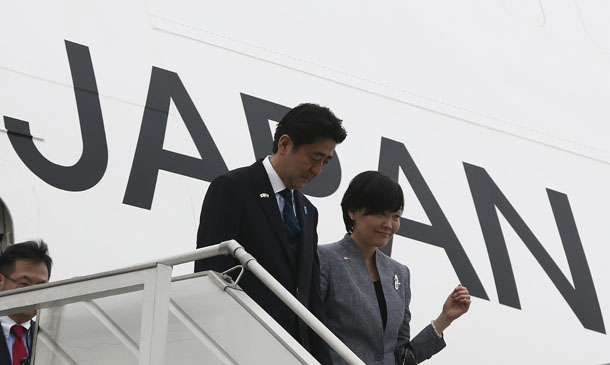TOKYO — One by one, women take the microphone near a crowded crossing in a popular Tokyo shopping district on a hot and humid weekday, denouncing Japan’s pacifist constitution, blasting China’s “recklessness” and mocking the South Korean flag.
“The Japanese constitution that cannot protect our children’s future is more dangerous than nuclear power,” said a banner held by members of self-styled patriotic women’s group Hanadokei, which sponsored the event.
Angered by demands from China and South Korea that Japan apologize again for wartime misdeeds and mistrustful of mainstream media and politicians, ultra-conservative Japanese housewives, mums and working women are speaking out.
One of the few leaders to win their praise is Prime Minister Shinzo Abe. Conversations with members of Hanadokei and another group, Soyokaze, offer a window into the mindset of ultra-conservatives who back Abe’s push to revise Japan’s post-war constitution and recast the country’s past with a less apologetic tone.
“In the past, Japanese people stayed silent no matter what,” Machiko Fuji, Hanadokei’s deputy head, told Reuters as she and her colleagues later grabbed lunch.
“But after others kept telling us over and over that we are wrong … we have passed the limit of our endurance.”
Like US Tea Party activists, the women use the Internet to share information, link up with followers and proselytize.
While their numbers are small, their views—which echo those of larger male-dominated nationalist groups—could at the margins affect policies from diplomacy to immigration, although Abe faces pressure to appeal to a broader base.
“They are still small groups, but their impact might be bigger than their size because they seem to resonate with average Japanese feelings to an extent,” said Mari Miura, a political science professor at Sophia University in Tokyo.
While Abe wins kudos, the women are disappointed at what they see as his bowing to diplomatic pressure on some issues. And they are less pleased with his ruling Liberal Democratic Party (LDP).
“Even inside the LDP there are people who want to denigrate Japan and are acting on behalf of the interests of China and South Korea,” said Hanadokei leader Makiko Oka. “I support Abe, but I can’t really support the LDP.”
Hanadokei, which literally means “Flower Clock,” and Soyokaze, or “Gentle Breeze,” trace their origins to the advent of the centrist Democratic Party of Japan government that ousted the dominant conservative LDP in 2009.
Many members were galvanized by fears the DPJ would give foreign residents the right to vote and legislate the rights of spouses to keep separate family names after marriage, both anathema to ultra-conservatives.
Soyokaze, with some 500 members nationwide, was founded in 2009 and Hanadokei, which boasts about 840 members including 300 men, sprang up in the following year.
Soyokaze’s members tend to be older than those of Hanadokei, many of whom are in their 30s. Both groups include housewives and working women.
High on their agenda is a campaign to revoke a 1993 apology by then-Chief Cabinet Secretary Yohei Kono acknowledging the involvement of authorities in coercing women, many Korean, to work in military brothels before and during World War II.
“Did Japan’s wartime heroes make Korean women sex slaves? This is a huge lie,” a Soyokaze member said through a microphone one Sunday near Tokyo’s Yasukuni Shrine for war dead, as members urged passersby to sign a petition to revoke the apology.
South Korea and China say Japan has not sufficiently atoned for the suffering of the “comfort women,” as they are euphemistically known in Japan.
Many Japanese conservatives say there is no proof of direct government involvement in coercing the women—a stance adopted under Abe’s first 2006-07 administration—and that other countries also exploited women in wartime.
Persistent criticism of Japan by China and South Korea has angered the ultra-conservative women, as well as irritated more moderate Japanese. “Why should Japan keep being singled out?” Soyokaze member Harue Sato asked Reuters in an interview.
Abe has questioned the Kono Statement in the past and in what many saw as a nod to his conservative base, the government is reviewing it. But mindful of potential diplomatic fallout, Abe has said he would not revise it.
Anger at Seoul’s demands spilled over into demonstrations last year in a Tokyo district home to many Korean restaurants and shops, in which some protesters called Koreans “cockroaches” and shouted “kill Koreans.” Several members of the women’s groups said they took part.
Central to the tenets of the nationalist women’s groups is a belief that mainstream Japanese media are biased toward the left and report lies and distortions—the reverse of liberal criticism that media are too eager to toe the government line.
“I realized that pro-Japanese media were very few,” said one 54-year-old Hanadokei member. “It’s the same in politics. There are lots of pro-China politicians and lots of pro-America politicians, but very few pro-Japan politicians.”
Like many other right-wing groups, the women’s organizations want Abe to regularly visit Yasukuni Shrine, seen by critics as a symbol of past militarism because Japanese leaders convicted as war criminals by an Allied tribunal are honored there along with war dead.
Abe paid his respects at the shrine last December, sparking criticism from China and South Korea, where memories of Japan’s occupation and colonization persist, and an expression of “disappointment” from Washington.
He has declined to say if he will go again.
While Abe doesn’t get a perfect score from the nationalist women, his return to power 18 months ago has given them hope that their views are shared by a silent majority.
“They are a minority but since Abe took office, they are supported by an atmosphere that makes them feel they are the majority,” said Minori Kitahara, a feminist author who has written a book about the groups called “Patriotic Wives.”

















